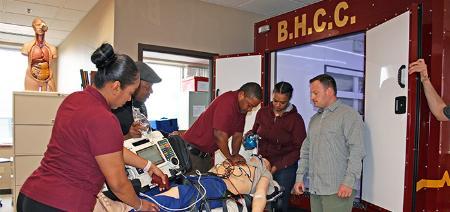
Take your healthcare career to the next level
Paramedics are certified Emergency Medical Technicians (EMTs) who have received additional training, are able to interact more with patients and play a critical role as first responders. Bunker Hill Community College offers two Paramedic Studies programs to give you the training you need to become a certified Paramedic. Each program prepares students to take the National Registry of Emergency Medical Technicians (NREMT) Paramedic written and practical examinations. Once you’ve passed these national exams, you’ll be ready to advance to a rewarding career as a Paramedic.
Choose the Paramedic Studies program that is right for you
Associate Degree in Paramedic Studies
With this associate degree program, you’ll get not only a certificate of completion in Paramedic Studies, but also a college degree under your belt. An associate degree can increase your salary potential and also open doors for future career advancement.
Certificate in Paramedic Studies
This program gives you the same Paramedic Studies training as the associate degree option, but can be completed in a shorter amount of time (about 15 months). You won’t get an associate degree, but you’ll still have the training you need to prepare you for the NREMT Paramedic exams and start your career as a Paramedic. If you decide you want to pursue your associate degree after completing this certificate program, you can enroll in that program and only be a few courses away from your degree.
About the Programs
 The Paramedics programs at BHCC provide instruction in advanced emergency pre-hospital medical skills including patient assessment, advanced airway management, vascular access, EKG interpretation and treatment, emergency pharmacology, management of medical and traumatic emergencies, Advanced Cardiac Life Support, Pediatric Advanced Life Support and International Trauma Life Support/Pre-hospital Trauma Life Support.
The Paramedics programs at BHCC provide instruction in advanced emergency pre-hospital medical skills including patient assessment, advanced airway management, vascular access, EKG interpretation and treatment, emergency pharmacology, management of medical and traumatic emergencies, Advanced Cardiac Life Support, Pediatric Advanced Life Support and International Trauma Life Support/Pre-hospital Trauma Life Support.
The programs, which follow the National Standard EMT-Paramedic Curriculum, meet and/or exceed the requirements set forth by the Commonwealth of Massachusetts, Office of Emergency Medical Services a subsidiary of CAAHEP and the Committee on Accreditation for EMS Professionals. Our experienced instructors utilize state-of-the art patient simulation equipment, including a self-contained, motion activated ambulance simulator located within our newly constructed EMS Classroom, located on the Chelsea Campus.
Visit the program requirements page for the Associate Degree and Certificate Program for information on prerequisites and requirements for each program.
Why become a Paramedic?
Paramedics are in demand across the country. According to the U.S. Department of Labor, employment opportunities are expected to grow by 15% between 2016 and 2026 (www.dol.gov). The U.S. Bureau of Labor Statistics (BLS) predicts that employment of emergency medical technicians (EMTs) and paramedics will grow 24 % between 2014 and 2024, which is much faster than the average for all U.S. occupations (www.bls.gov). A growing aging population is expected to increase the likelihood of medical emergencies, thus increasing the need for EMTs and paramedics. Plus, emergency rooms are frequently overcrowded, which increases the amount of time that EMTs and paramedics must spend with each patient. This is also likely to increase the number of job positions. Job projects are expected to be good since paid employees are needed to replace volunteers who have a high turnover rate. To increase your employment opportunities, seek employment with private ambulance services or in cities, since competition is greater for government positions.
The BLS also reports that the average annual salary for paramedics and EMTs was about $35,430 in May 2015. During the same month, the highest-paying states were the District of Columbia (average $59,010), Washington (average $58,370) and Alaska (average $54,000), while the top-paying employers were state governments, with an average of $59,890.
The Bunker Hill Community College Paramedic program is accredited by the Commission on Accreditation of Allied Health Education Programs (www.caahep.org) upon the recommendation of the Committee on Accreditation of Educational Programs for the Emergency Medical Services Professions (CoAEMSP).
To contact CAAHEP:
Commission on Accreditation of Allied Health Education Programs
727-210-2350 | www.caahep.org
To contact CoAEMSP:
214-703-8445 | www.coaemsp.org
CoAEMSP, the only comprehensive National EMS education accreditation agency in the U.S., aims to improve the quality of EMS education by implementing a rigorous accreditation process for qualifying paramedic training programs.

